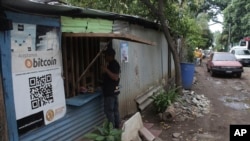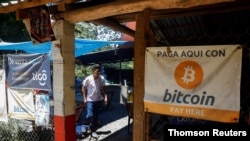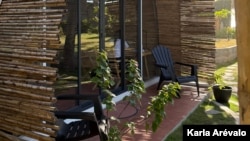When the town of El Zonte, in El Salvador, became known in 2019 as the “bitcoin beach”, it was not a modern coastal area. Their houses were made of sheet metal and concrete, their streets were impassable due to the mud accumulated by a poor drainage system, and the offer of restaurants and accommodations was almost non-existent.
Five years after its inhabitants integrated cryptocurrency into their traditional community, Zonte has another face: the streets are now made of asphalt, the infrastructure has gone from being rustic and underdeveloped, to having modern beach houses, hotels and restaurants that Now they attract tourists in droves.
Although technology is apparently here to stay, Zonte retains its traditional identity: it remains a fishing town with a modest economy, where in addition to the dollar, small and medium-sized merchants also charge in bitcoin, adapting to the needs of those who They visit them.
“All businesses use bitcoin. (…) It has benefited us and continues to benefit us. It is much more practical not to carry around (with) coins in the bag, but just take out the phone and pay, it is something that we did not do before,” he told the Voice of AmericaJeremías Centeno, a young merchant who sells groceries in El Zonte.
Before El Salvador adopted bitcoin as legal tender, El Zonte already used the cryptocurrency in its daily transactions: from the purchase of a candy to a small accommodation.
However, its use – apparently – survives only in this area, since according to a survey published in 2023 by the University Institute of Public Opinion (Iudop) of the José Simeón Cañas Central American University (UCA), eight out of ten Salvadorans do not use bitcoin.
This despite the fact that El Salvador was the first country in the world to adopt bitcoin as legal tender, alongside the US dollar. Which means in theory that cryptocurrency should be accepted as a means of payment throughout the national territory.
But its use at the national level is limited and continues to face knowledge challenges.
Gabriel Palma, who runs The Bitcoin Hardware house, said enthusiastically: “we continue to teach everyone who wants to learn, whether in English or Spanish, so that any individual or business knows everything about bitcoin.”
“The mission is to accelerate its adoption,” he explained from a house located in El Zonte where he receives people interested in cryptocurrency on a daily basis. “I am interested in educating and affecting the life of each person in the community where I am, in a positive way,” he added. to the VOA.
Before bitcoin, the inhabitants of El Zonte survived from artisanal fishing, and to a lesser extent from agriculture.
Others were dedicated to serving the few surf lovers who came to the beach. At that time, tourism was reduced and low profile compared to other beaches such as El Tunco, located on the same coastal strip, whose infrastructure is modern and has strong promotion that attracts tourists en masse.
El Zonte, on the other hand, had limited access to services such as drinking water, electricity and sanitation systems. Furthermore, there were only hostels or small accommodations.
Today, El Zonte is a community trained in the use of cryptocurrency. It is also highly accepted among tourists who come in search of waves, elegant accommodations and easy payment with cryptocurrencies.
Wayne Larson came to El Zonte from Florida, United States. He was looking for the bitcoin beach, which he described as “fun.” He assures that he used bitcoin ten years ago, and did not rule out using it again on the beach where its use is normalized.
Like Larson, dozens of tourists come to the Salvadoran coastal area following the Salvadoran government’s tourism strategy known as Surf City, which promotes coastal tourism in modern infrastructure.
As part of that project, the government is expanding a road that connects El Zonte and El Obispo, another beach near Sunset Park, an amusement park financed with cooperation from the People’s Republic of China.
In addition to building a sewage treatment plant, with US cooperation funds.
How did the transformation begin?
In 2019, a group of local leaders in El Zonte received an anonymous donation of bitcoin for the purpose of educating the community on cryptocurrency.
In order for the community to benefit, the project initially consisted of adopting a circular economy, that is, bitcoin transactions were made within the community, thereby strengthening local businesses.
Additionally, getting residents of El Zonte to use cryptocurrency would allow unbanked people to access financial services.
Since then, El Zonte has been that unique experiment in El Salvador where cryptocurrency was integrated into the local economy, and where it continues to grow.
Rubén García has lived his 30 years in El Zonte, and remembers how a few years ago the beach began to be “populated” with people who knew how to handle cryptocurrency.
“They came and it began to be populated by people who already knew and bitcoin began to emerge. Quite a few businesses began to adopt the currency, to make it normal, to make it part of them,” he told the VOA. “Today it is more common for people to pay with bitcoin than with dollars,” he added.
Although the price of the cryptocurrency goes down or up, the inhabitants of El Zonte do not stop promoting it, as they assure that its adoption made them visible and allowed them to access greater development for their community.
Since its creation in 2009, the cryptocurrency began trading at 0.05 cents, and although in recent years it has risen and fallen in price, as of December 16, Bitcoin exceeds $106,029.
While the cryptocurrency reaches all-time highs, El Salvador President Nayib Bukele added that the value of El Salvador’s bitcoin holdings increased by 117.74%, reaching approximately $603.34 million.
Since the Central American country legally adopted the currency in 2021, the government claims to have purchased more than 200 bitcoin.
Connect with the Voice of America! Subscribe to our channels YouTube, WhatsApp and to newsletter. Turn on notifications and follow us on Facebook, x and instagram!






![[Img #74676]](https://thelatestnews.world/wp-content/uploads/2024/12/Laser-artificial-neuron-150x150.jpg)












Add Comment